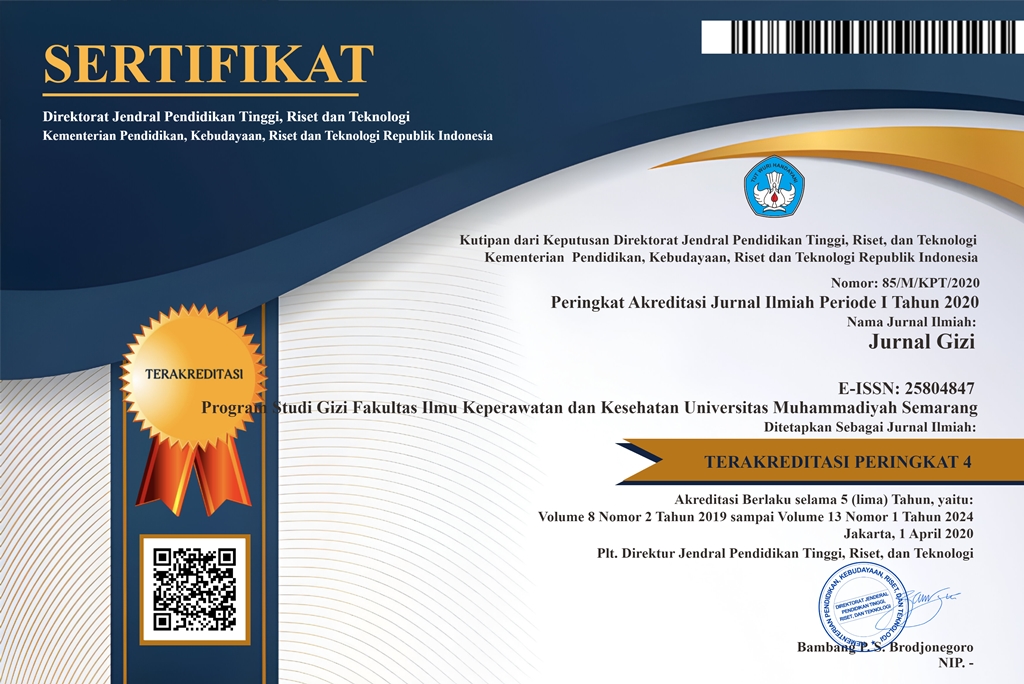Suhu Makanan dan Sisa Makanan Pasien Dewasa Diet Lunak di Rawat Inap Penyakit Dalam Rumah Sakit Umum Daerah Kota Semarang
(1)
(2)
(3)
(*) Corresponding Author
Abstract
The food temperature is one of the factors affecting the leftovers of soft diet inpatients of the hospital. Research aims to understand how the relationship of food temperature with leftovers of soft diet of internist inpatients.
The kind of research is explanatory reserch using survey methods and with the crosssectional approach. The populationis all of adult inpatients who obtain the diet soft at public hospital of Semarang City. The sample chosen by the inclusion and exclusive criteria that we have seted. Data analysis using the pearsoncorrelationstatistic test.
The result shows from the number of 33 samples, there are 54,4 % of them are 41-60 years old, 57,6 % a women, 60,6 % who hospitalized three days or above, 39,4 % who senior
high school educated and 42,4 % of them who suffer febris medical. The food’s temperature was4,5 o C – 60 o C, in danger zone. Leftover food of porridge diet was 22,15% ±SD 7,35%, animal protein diet was 34,14% ± SD9,30%, nabati protein diet was 38,63% ±SD 14,53% and vegetables diet was 38,10% ±SD 12,20%. There is no correlation between the food’s temperature with leftovers of porridge diet (p = 0.277, no correlation between the food’s temperature with leftovers of animal protein diet (p = 0,116),no correlation between the food’s temperature with leftovers of nabati protein diet (p = 0,709). There is a correlation between the
food’s temperature with leftovers of vegetablesdiet(p = 0,006).
The conclusion, at the hospital of Semarang City, especialy the adult inpatient, the food’s temperature related to the food’s rest of vegetable diet, but no related to the food’s rest of porridge diet, animal protein diet and nabati protein diet.
Keywords :Food Themperature, Leftovers, Soft Food
The kind of research is explanatory reserch using survey methods and with the crosssectional approach. The populationis all of adult inpatients who obtain the diet soft at public hospital of Semarang City. The sample chosen by the inclusion and exclusive criteria that we have seted. Data analysis using the pearsoncorrelationstatistic test.
The result shows from the number of 33 samples, there are 54,4 % of them are 41-60 years old, 57,6 % a women, 60,6 % who hospitalized three days or above, 39,4 % who senior
high school educated and 42,4 % of them who suffer febris medical. The food’s temperature was4,5 o C – 60 o C, in danger zone. Leftover food of porridge diet was 22,15% ±SD 7,35%, animal protein diet was 34,14% ± SD9,30%, nabati protein diet was 38,63% ±SD 14,53% and vegetables diet was 38,10% ±SD 12,20%. There is no correlation between the food’s temperature with leftovers of porridge diet (p = 0.277, no correlation between the food’s temperature with leftovers of animal protein diet (p = 0,116),no correlation between the food’s temperature with leftovers of nabati protein diet (p = 0,709). There is a correlation between the
food’s temperature with leftovers of vegetablesdiet(p = 0,006).
The conclusion, at the hospital of Semarang City, especialy the adult inpatient, the food’s temperature related to the food’s rest of vegetable diet, but no related to the food’s rest of porridge diet, animal protein diet and nabati protein diet.
Keywords :Food Themperature, Leftovers, Soft Food
Full Text:
PDFArticle Metrics
Abstract view : 2495 timesPDF - 675 times
DOI: https://doi.org/10.26714/jg.6.1.2017.%25p
Refbacks
- There are currently no refbacks.
Diterbitkan oleh: Program Studi Gizi (D3 dan S1)
Fakultas Ilmu Keperawatan dan Kesehatan
Universitas Muhammadiyah Semarang
Sekretariat: Jl. Kedungmundu Raya No. 18 Semarang
Contact Person : Hapsari Sulistya Kusuma, S.Gz, M.Si (+62 85 6 41 536 553)

This work is licensed under a Creative Commons Attribution 4.0 International License.










.png)
.png)
_.png)